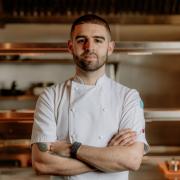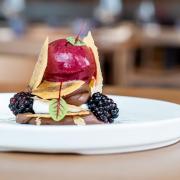'I feel like you have to have audacity to even imagine a book like this,' laughs Lerato Umah-Shaylor. We’re talking about Africana, the Nigerian food writer’s debut cookbook, which takes as its subject the cuisine of an entire continent, from Nigeria to Madagascar, Morocco to South Africa. It’s a sumptuous book, rich in detail and personality, but really, all of Africa? 'I did begin just with Nigerian recipes, but I got bored,' she explains with a smile. 'It wasn’t representative of my experience.'
Born in the Nigerian capital of Lagos, West Africa, Lerato’s parents chose to give her a Southern African name – Lerato means love in the Southern Bantu language of Sotho-Tsawna – and she spent her childhood on the move, living in other West African countries, as well as in Europe and in the UK. She now lives near the seafront in Eastbourne with her broker husband Thurston Shaylor – who grew up in the town - and their dog Tuppence. 'My background is not really in one place, so I’ve grown up with favourite dishes from all kinds of countries,' she says. 'I was full of passion, recipes and experiences that I needed to share.'
Lerato is aware that she has taken on an ambitious subject: 'I do feel a sense of responsibility because, while I’m African, I’m not from all the countries in Africa. But I think it would be a pity if that concern stopped me from writing about something I’m so passionate about. I feel more responsible for making sure these stories are shared.' There are few examples of written recipes in African cooking, she says. Most are passed on through word of mouth and by hand, in the kitchen. In her introduction to Africana, Lerato writes of learning to cook as a child by acting as sous-chef to the family’s cook, Papa. 'I learnt to cook intuitively, measuring by eye, by touch – feeling every grain of salt crushed between my fingers – by taste and trusting my palate.'
It meant that making the book – which is packed with dishes made by friends and aunties, street market vendors and wedding caterers - was an act of translation as much as anything else. 'When my mother is telling me about her egusi soup, for example, she’s not telling me to add one cup of this or two tablespoons of that. She’s describing how it’s nice and creamy, smoky and spicy. So I have to use her description of how it tastes to try to create a recipe.' As a result, the recipes also take on Lerato’s own twists. Egusi – which appears in the book as Mum’s Melon Seed Soup – is traditionally made by pounding yams with a giant pestle. 'It is hard work and requires the synchronicity of athletes,' notes Lerato, who suggests using a food processor to bypass the chore. 'I’m not a purist,' she says. 'The book is rooted in tradition but it’s not a traditional book. It’s not meant to be strict. I want Africans and non-Africans alike to feel a sense of ownership and inspiration.'
More than anything she wants to share the richness of African food which, as she says, is so much more than the ubiquitous joll of rice. 'Moroccan food is fragrant while Tunisian and Algerian food is often a bit spicier. Senegalese food has this tangy note with a lot of tamarind – there are so many flavours to discover.'
In the cookery schools she runs in Eastbourne and London, Lerato likes to push students to try ingredients they might not have used before – plantains, for example, a cooking banana popular in east and west African cooking to which she devotes a whole section of Africana. 'They’re very accessible – sometimes you just have to ask your grocer – and they’re really versatile. You can roast them, fry them, put them in curries, even serve them sliced as canapes. But how do you know which ones to buy? Green, unripe, yellow plantains, overripe ones? That’s why I have a whole chapter on cooking and shopping for them.'
It's important to step out of your comfort zone, she says. 'If there’s a spice you haven’t heard of - Google it! You won’t find every ingredient in Sainsbury’s. Talk to your greengrocer, your local halal shop. I’d love people to try more spices. Grains of paradise, for instance, are a wonderful pepper; fragrant, a little bit hot and a great alternative to black pepper. They’re lovely in an apple pie or in a chai.' She’s recently experienced the benefits of stepping out of her own comfort zone by becoming involved with Eastbourne’s Gather Community Garden in Churchdale Allotments, Churchdale Road, run by her neighbour Dave Roberts. 'It took me a while to get involved because I’m very dirt-averse,' Lerato says. 'I love cooking but I don’t like to get mucky. It’s just not me. But what pulled me in was that I felt needed. They wanted me to come and help people with ways to use the produce, so I felt I had something to offer.' While she still steers clear of sowing and harvesting: 'I’ve learnt so much. We’ve harvested charlotte potatoes, courgettes, purple peas – all this produce you don’t see in the supermarkets. Every day I go there I’m learning, meeting new people and I come back feeling really happy.'

Lerato never expected to become a food writer. She studied economics at university: 'I wanted to save the world, be a champion of African development. But you know, sometimes things creep up on you.' On graduating she launched a pizzeria in Abuja. 'It was a business decision because in Nigeria we love international food and there were very few pizzerias.' One day she got chatting to a customer who was a TV producer and asked her if she would like to front his new cookery show. On the back of the TV show she was asked to produce a weekly food column for Nigerian newspaper The Guardian. Then, when she later met her husband and they moved to Eastbourne, she launched a supper club, cooking everything from plantain pie to moin moin – a black bean tart - for her guests. Now, her first cookbook. 'I’ve been writing this book for five or six years – originally without a book deal. I’ve had this idea bubbling inside me and I finally decided to stop waiting for someone else to do it. There’s only a handful of us talking about African food in mainstream media and we need to speak out more. This is the food of my continent and I want more people to enjoy it.'
Africana, HC, £22.





























